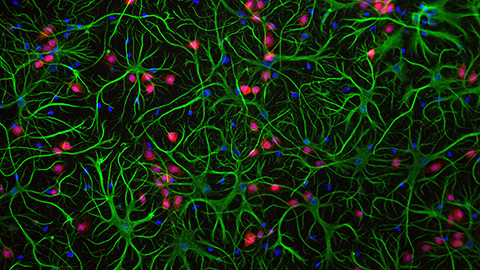Harnessing a natural plant insecticide for commercial use
Many plants produce molecules or peptides that help them combat destructive insects. These natural insecticides hold a lot of promise for improving how we can protect crops around the world from pests without harming the environment
Developing plant insecticides into eco-friendly products is one area of interest in David Craik’s laboratory, which is part of the Institute for Molecular Bioscience at the University of Queensland, Brisbane, Queensland, Australia.
Craik’s lab identified a group of cyclotides in a prior study and found that they have natural insecticidal properties. Cyclotides are unique; unlike typical peptides that form linear chains of amino acids, cyclotides link together end to end to form circular peptides. These cyclopeptides can interact with specific phospholipids that form cell membranes. This can happen within the insect’s gut and cause cell swelling or lysis that results in death or growth restriction of the insect. The Craik lab has become interested in studying the applications of these cyclotides, particularly as potential pesticides.
In their recent study, conducted in collaboration with Syngenta Crop Protection AG, an international agriculture technology company, and published in the Journal of Biological Chemistry, Craik’s lab focused on a specific cyclotide known as kalata B1. For an insecticide to have broad use, a business must be able to manufacture it efficiently and cost-effectively. It must also remain stable in a variety of environmental conditions where factors such as temperature and pH may differ considerably.
To address these issues, the Craik lab mutated specific amino acids within the cyclotide to determine their impact on the molecule's stability under varying conditions. This was achieved through a technique called a lysine scan, where each amino acid within the cyclotide was systematically replaced with lysine. The researchers then evaluated whether the change enhanced the stability of the cyclopeptide.
This work enabled the lab to create a more stable cyclopeptide capable of targeting insect cells from the fall armyworm, a major pest worldwide. They also confirmed that they could manufacture this cyclopeptide efficiently and safely.
“We can actually use a natural recombinant process to produce these proteins,” Craik said. “Some types of peptide synthesis can be quite an environmentally unfriendly process in terms of the amount of waste materials produced. But if you can produce peptides, and then cyclize them using enzymes rather than chemicals, you have a much greater production pathway.”
As of now, the only other cyclotide insecticide on the market is one known as Sero-x. Approved for use in Australia, it is applied to cotton plants and certain vegetable crops.
The next step for the Craik lab is to feed the cyclotide insecticide to fall armyworms and determine if it is effective in killing them. If these trials prove successful, another cyclotide insecticide may soon be available for use.
Enjoy reading ASBMB Today?
Become a member to receive the print edition four times a year and the digital edition monthly.
Learn moreGet the latest from ASBMB Today
Enter your email address, and we’ll send you a weekly email with recent articles, interviews and more.
Latest in Science
Science highlights or most popular articles

Avoiding common figure errors in manuscript submissions
The three figure issues most often flagged during JBC’s data integrity review are background signal errors, image reuse and undeclared splicing errors. Learn how to avoid these and prevent mistakes that could impede publication.

Ragweed compound thwarts aggressive bladder and breast cancers
Scientists from the University of Michigan reveal the mechanism of action of ambrosin, a compound from ragweed, selectively attacks advanced bladder and breast cancer cells in cell-based models, highlighting its potential to treat advanced tumors.

Lipid-lowering therapies could help treat IBD
Genetic evidence shows that drugs that reduce cholesterol or triglyceride levels can either raise or lower inflammatory bowel disease risk by altering gut microbes and immune signaling.

Key regulator of cholesterol protects against Alzheimer’s disease
A new study identifies oxysterol-binding protein-related protein 6 as a central controller of brain cholesterol balance, with protective effects against Alzheimer’s-related neurodegeneration.

From humble beginnings to unlocking lysosomal secrets
Monther Abu–Remaileh will receive the ASBMB’s 2026 Walter A. Shaw Young Investigator Award in Lipid Research at the ASBMB Annual Meeting, March 7-10 in Washington, D.C.

Chemistry meets biology to thwart parasites
Margaret Phillips will receive the Alice and C. C. Wang Award in Molecular Parasitology at the ASBMB Annual Meeting, March 7-10 in Washington, D.C.


